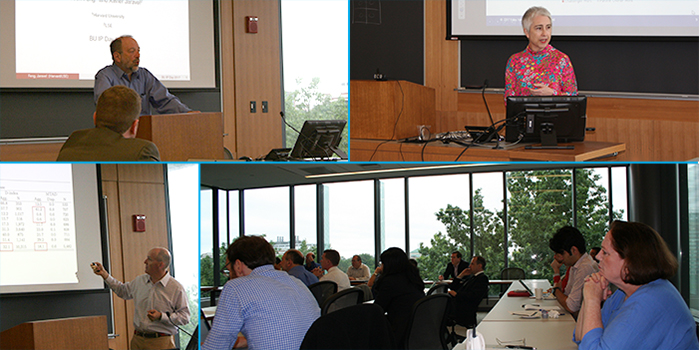BU Law Technology & Policy Research Initiative Hosts Intellectual Property Conference
Scholars from across disciplines gathered to hear presentations on the latest IP law research focusing mainly on patent law and litigation.

Boston University School of Law welcomed intellectual property scholars from around the country and across multiple disciplines—including law, economics, and history—to the Redstone building on July 25 for BU Law’s Intellectual Property Day.
The conference was organized by James Bessen, executive director of the Technology & Policy Research Initiative (TPRI) and lecturer at BU Law, Michael Meurer, professor of law and Abraham and Lillian Benton Scholar at BU Law, and Tim Simcoe, associate professor of strategy and innovation at BU’s Questrom School of Business. The purpose of the conference was to bring together a variety of people with an interest in IP law, such as lawyers, law professors, and economists, giving them an opportunity share ideas and connect with one another.
Most of the day’s papers dealt with patent law and litigation. Josh Feng, a PhD candidate in economics at Harvard, and Professor Simcoe set the tone for the morning by presenting papers about patent examiners. In the paper, Feng and his colleague Xavier Jaravel determined that the behavior of patent examiners tends to influence the purchase and litigation behavior of patent trolls, or non practicing entities (NPEs). “We find that patents purchased by NPEs are, on average, granted by examiners who allow more incremental patents and patents with vaguer language,” they wrote. Professor Simcoe and BU PhD candidate Cesare Righi showed that patent examiners at the USPTO, most notably in biotech and chemistry, specialize in certain types of patents. They also observed that examiners who specialized tended to grant fewer patents and narrow the scope of a patent claim to a greater degree than their less specialized colleagues.
Filippo Mezzanotti of Northwestern University’s Kellogg School of Management and Erik Hovenkamp of Harvard Law School presented papers that focused on patent litigation. Mezzanotti analyzed the impact of the 2006 Supreme Court decision eBay vs. MercExchange, which made it more difficult for plaintiffs in patent cases to receive permanent injunctions in infringement cases. He found that the decision had a positive effect on innovation and on stock prices of companies more exposed to litigation, and argued empirically that patent litigation has a negative effect on innovation.
Hovenkamp, with Jonathan Masur of the University of Chicago. Hovenkamp and Masur proposed a new standard for awarding damages that isn’t tied to pre-litigation licensing agreements. They argued that a “licensing-based” standard, which courts often prefer to use, causes damage to the market for licenses, and that it does not provide an accurate measure of appropriate damages. In addition, Harvard Law School’s Kathryn Spier looked at litigation issues from another angle. Spier described a phenomenon in which plaintiffs suing a company would take a short financial position in the defendant’s stock. She argued that this increases the potential financial benefit of the lawsuit for the plaintiff.
Th
The purpose of the BU Law Technology & Policy Research Initiative, launched in June, is to study the impact on society of technology and technology-related policies. The initiative researches how new technology affects the workforce, examines how intellectual property policies can drive innovation, and studies the relationship between government policy, technology and the market.
“At a time when the threat of new artificial intelligence technologies is creating widespread concern, the general public needs to understand the actual economic effects of these changes and policymakers need evidence to develop better policy. Well-developed empirical research is critical,” said Bessen earlier this year.
Reported by Trevor Persaud (STH’18)
Related News
- BU Law School Research Initiative to Focus on Technology’s Impact on Society’s Well Being
- Keith Hylton Serves as President of the American Law & Economics Association
- BU Law Graduate Awarded General Electric Fellowship